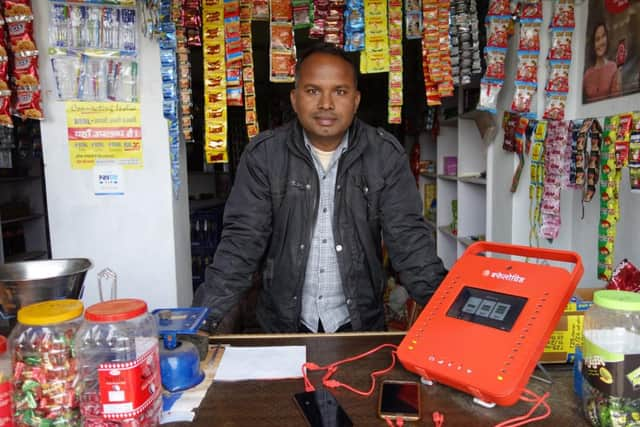Scottish product design firms help develop phone charger for developing world
While the mobile phone has become vital in many developing countries where people do not have access to laptops, tablets or PCs, power infrastructure remains poor, unreliable or frequently non-existent.
It is thought that 700 million people with access to a phone do not have power, including 300 million in India alone. Globally, it is estimated that some one billion people do not have access to reliable power.
Advertisement
Hide AdAdvertisement
Hide AdTech start-up BuffaloGrid has hit upon a solution in the form of a mobile phone charging hub which has an internet connection and can charge multiple phones at one time with power supplied by solar panels.


The prototype device is being used in mobile operator shops in rural parts of India where the electricity supply is unreliable and intermittent, as well as in refugee camps across the world.
The company has also teamed up with Techfugees to provide free educational, health and other digital content via the hub in East Africa and the Middle East.
BuffaloGrid turned to Scotland-based A2E and Wideblue, two companies in the Pivot International group, to help with the technical details when it came to designing the prototype hub.
Glasgow-based Wideblue worked on the mechanical design and A2E, which is based in Livingston, on the electronics and software. When the device goes into volume production Pivot will handle manufacturing through its production facilities in Asia.
David Ross, managing director of A2E said: “This has been a very interesting and worthwhile project to work on as it has used the technical capabilities of the whole group.
“We take power supply for granted in the developed world but there are many areas of the world where it is unreliable and unpredictable.”
BuffaloGrid boss Daniel Becerra said: “Working with Pivot, A2E and Wideblue has been the perfect solution for our needs. When producing hardware, having the link between developers and manufacturer within the same group makes things extremely efficient and safe.”
Advertisement
Hide AdAdvertisement
Hide AdThe firm is planning to commercially supply hundreds of hubs in the next 12 months and is in talks with the UN regarding projects in Uganda, Papua New Guinea, Haiti and Rwanda.
A message from the Editor:
Thank you for reading this article. We’re more reliant on your support than ever as the shift in consumer habits brought about by coronavirus impacts our advertisers. If you haven’t already, please consider supporting our trusted, fact-checked journalism by taking out a digital subscription: www.scotsman.com/subscriptions
Comments
Want to join the conversation? Please or to comment on this article.
